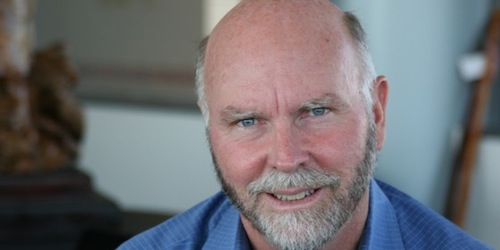 Intelligent Design
Intelligent Design
 Life Sciences
Life Sciences
Craig Venter in Seattle: “Life Is a DNA Software System”

Last night I attended a talk by biotech giant Craig Venter at Seattle’s Town Hall, where he was promoting his new book, Life at the Speed of Light: From the Double Helix to the Dawn of Digital Life. Venter is quite an engaging speaker, and he strongly emphasized analogies that compared life to technological systems. In his formulation, as indeed in that of Stephen Meyer and many advocates of the theory of intelligent design, life is based upon “software.”
Venter said the cell is a “biological machine,” full of “protein robots” which are “not simple robots.” DNA is “software” that contains “digital information” or “digital code.” He pointedly stated, “Life is a DNA software system,” and asked, “How do we boot up a synthetic chromosome?”
Venter discussed his research creating such a “synthetic chromosome,” and thinks it’s important to insert watermarks into them so as “not to confuse evolutionary biologists.” I found this curious, and I guess he said it because he knows evolutionary biologists assume nothing is designed, and would therefore assume that even a synthetic chromosome wasn’t designed if you don’t include the watermark thus evidencing its non-natural origin.
He predicted that by sending genetic information over the Internet, we can accomplish “biological teleportation.” That isn’t teleportation á la Star Trek, but basically, you have a machine on one end that sequences a genome, then transmits the genetic information over the Internet to a machine elsewhere capable of receiving the information and outputting an identical chromosome on the other end. He envisions this happening someday. We might have machines in our homes that “print out” the latest vaccines, transmitted from the government. He suggested that if there’s life on Mars, we won’t necessarily need to bring home biological samples, but could just send probes to remotely sequence the genomes of Martian life and use “biological teleportation” to get it home.
Venter was asked about “junk DNA” and made some fascinating comments in reply. He said people have “arrogantly called parts of the human genome that don’t code for protein ‘junk DNA.'” But then he said that today junk DNA is “where all the discoveries are happening” and we know that junk DNA is crucial for gene regulation. He also said we already know that bacterial genomes are extremely streamlined, though we still don’t know what even 10 percent of bacterial proteins do. But he admitted that we “only have minimal understanding” of how junk DNA works, and so we have a lot to discover in that area. To the amusement of the audience, said he knows people whose junk DNA he’d like to remove but doesn’t recommend doing it. The implication, of course, was that junk DNA is vital for survival and biological functionality.
If you were to merge Venter’s views on the widespread function of noncoding DNA with his view of DNA being “software,” you might get an article like this recent one from Genetic Engineering & Biotechnology News, titled “What Junk DNA? It’s an Operating System.”
Of course Venter is a thoroughgoing evolutionist, and didn’t intend to suggest that any of this supported intelligent design. The Q&A afterward was relatively brief, and I didn’t ask any questions. But I suppose if I had, I would have asked something like this: Given your view that DNA is software, are you aware of any examples where software had its ultimate origin in anything other than intelligence? It would be have been interesting to hear his answer.
Image credit: Town Hall.
